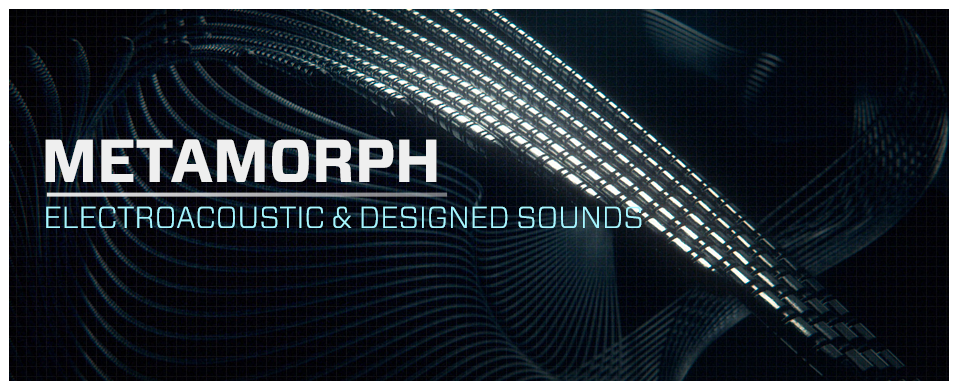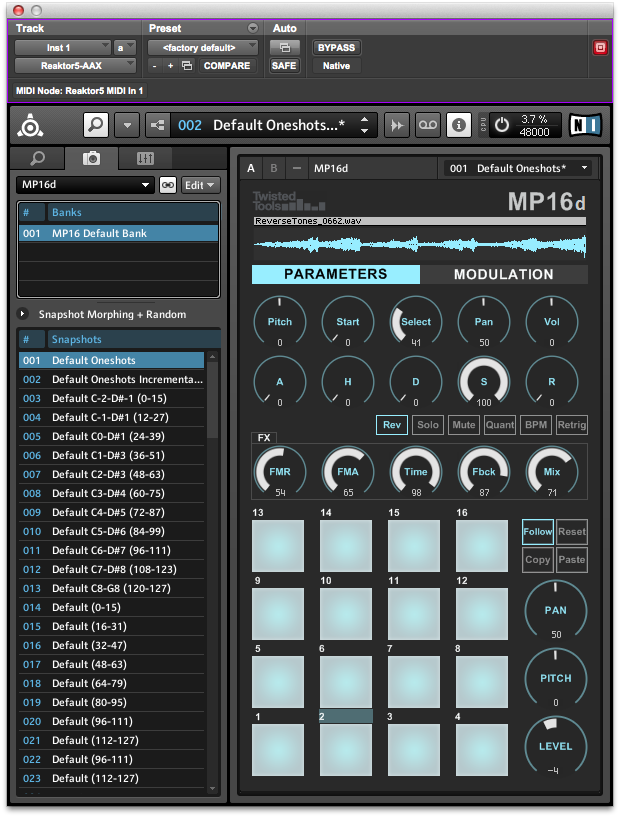
METAMORPH is the latest sample library from Twisted Tools, makers of the designed sample libraries as well as some fun and unique Reaktor ensembles. With sounds designed by BJM Mario Bajardi and Komplex (Iter-Research), METAMORPH “takes heavily processed violins, pianos and acoustic instruments and morphs them into impacts, sci-fi atmospheres, user interface elements and beyond.”
METAMORPH comes as stereo 24-bit, 96kHz BWAV files with full SoundMiner metadata for easy searching. It includes sampler kits for Ableton Live 9’s Sampler and Simpler, Logic 9’s EXS24, and Native Instruments’ Kontakt, Battery, and Maschine; Also induced is the MP16d, Twisted Tools’ sample player. METAMORPH contains just over 2 GB of samples broken down into 10 categories: Drums, Imaging Elements, Micro, Noises, Pass By, Sci-Fi Atmos, SFX, Textures, Tonal, and Composite. The “Micro” category includes User Interface and “Microbot” elements. There’s a good selection of sounds to be had, and the added metadata makes finding things fairly easy.
The Sounds
This is a designed library, so everything has been extensively processed; You end up with a variety of electronic, sometimes aggressive sounds that are right at home in any sci-fi or futuristic setting. What’s really impressive is how most of the sounds are almost completely unrecognizable from their source, while others maintain many of the characteristics of the original with an eerie, otherworldly twist.
Since the files are all 24/96, the user has a lot of latitude when it comes to processing the sounds further, especially when it comes to time stretching or pitch shifting. Some samples are far more processed than others, a few to the point where the processing is right in your face. This limits the possible uses for some samples, especially in situations where obvious signal processing isn’t wanted. However, if you need some hi-tech sounds, these super processed samples can fit the bill nicely.
The categories are well-organized and make navigating the samples fairly easy. The “Composite” category, as its name suggests, is made up of pre-built sound FX compositions. These sounds are designed to stand alone, and they do so quite well, though using them as an element in a larger composite can require a bit of alteration to work. “Drums” contains one-shot samples that can be used as the various elements of a drum kit, and sounds in the “Imaging Elements” category are perfect for creating brand imaging tags and logos. The “User Interface” subcategory (under “Micro”) is full of samples that are perfect for game menu interfaces or telemetry FX, while “Microbot” is full of great little robot movements and vocalizations. “Noises”, “Pass By”, “Sci-Fi Atmos”, “SFX”, “Textures”, and “Tonal”, round out the rest of the package.
The included metadata is really helpful in navigating the library. It contains a lot of useful descriptors, denoting things like timbre, articulations, processing, possible uses, and even some hints at the original source. If I want low or distorted sounds, I can simply do a quick search and find the right sounds fairly painlessly. For those without SoundMiner, the file comments are available and searchable in things like the Pro Tools Workspace Browser, and lists of all the files and metadata are included in TXT, PDF, and XLS formats in the documentation folder.
There are also many musical elements to the sounds, which makes sense given the samples’ original sources. While the manual suggests that the samples can be used to add “unique timbres” to music, I found that it was possible to create some eerie and abstract music using just the sounds included in METAMORPH. At one point, I used an assortment of the “Tonal” samples to create a temp score for a short horror film, using the included MP16d in Reaktor.
The MP16d

The MP16d is a 16-pad sample player with built-in FX, tempo-based loop re-triggering, and frequency modulation. It runs as an ensemble within Native Instruments’ Reaktor and can be used either in standalone mode or as a plugin. The MP16d requires the full version of Reaktor 5.8 or higher; the free Reaktor Player is not supported. Included in each sample category are Reaktor MAP files, which quickly load the sounds into the ensemble for playback via MIDI or OSC. It ships with a Lemur OSC template, which is used by the JazzMutant Lemur app on iOS devices. This gives you direct multitouch control of the device’s parameters and playback pads. It would have been nice to have a TouchOSC template included as well, though building my own template probably wouldn’t be too difficult. Everything on the MP16d is MIDI-learnable, and I had no trouble mapping parameters to knobs on my M-Audio 02 controller.
It’s possible to load a total of 128 sounds into the MP16d, though you can only play back 16 at a time. In order to assign one of these samples to a pad for playback, you simply click or trigger the pad via MIDI, then turn the “select” knob until it displays the number of the sample you want to load; This number is the note number the sample has been assigned in the MAP file, which can be viewed by opening the Sample Map Editor in Reaktor. Each MAP file also loads up snapshots, allowing you to load 16 sounds at a time (Snapshot 003 for samples 1-16, Snapshot 004 for 17-32, and so on).
Once sounds are loaded, holding a key down will play the sound assigned to the corresponding pad and letting go of the key will stop the sound. By default, all of the parameters on the top half of the screen will apply to the last pad selected, which is indicated by a light blue highlight. You can separate the selection and playback by hitting the “Follow” key, though keeping them tied together is ideal in most situations.
With the MP16d, you can very quickly alter pitch, level, and panning, change a sample’s start position, and like most other samplers, adjust the ADSR envelope. You also have two assignable low frequency oscillators per pad, which can be used in conjunction with the FX parameters to create some really wild sounds. I found it very easy to quickly audition sounds, coming up with interesting combinations and the proceeding to mangle them into something completely new and different. If anything, the MP16d is a ton of fun.
One thing worth noting about the MP16d is that it does help to have a little bit Reaktor know-how. Loading patches requires entering edit mode, right clicking on the waveform display, hitting “Load Map”, then navigating to the MAP files. For anyone who is used to working in Reaktor, this isn’t a big deal, but for someone just getting into the program, it can be a little daunting.
Luckily, the included documentation is really helpful in getting you set up. In fact, everything is well labeled and clearly documented; the tool tips are great and the manuals are well done. Additionally, clicking the “B” view in the Reaktor ensemble will display a handy quick start guide, which means less time is spent going to the documentation folder.

Unlike the MP16d, the other included kits for Live, Battery, Kontakt, Maschine, and Logic simply map the various samples across a keyboard. This allows for more than 16 files to be addressed at a time, but it omits the FX and processing available in the MP16d. While there are varying degrees of DSP or FX available in each of these different samplers, I really feel that the MP16d comes out ahead, having been custom-tailored for this library. Still, for users without Reaktor, these kits offer a great way to work with these samples on the fly.
Conclusions
Overall, I had a lot of fun with METAMORPH. The samples themselves are really unique and varied, and I can definitely see myself using them the next time I need sci-fi or futuristic sounds. I do think that there are a few cases where the processing becomes a tad distracting, but it never hits a point where I would say that the sample becomes useless. In fact, with a little tweaking, it’s possible to get a lot of these super-processed elements to play well together. The inclusion of the MP16d is a nice addition, as it opens up so many possibilities for further processing and alteration. Just to see what I could do, I cut together a short sci-fi sequence in which a ship powers up and goes into hyperspace:
All of the sounds are from METAMORPH (not using the MP16d) with very little processing, save for some EQ and a reverb tail at the end. As you can hear, there’s a good variety of tonal, atmospheric sounds, along with some more aggressive and distorted ones.
Coming in at about $70, METAMORPH is a great, affordable sound library for someone who’s looking for unique electronic sounds for their next film, game, or commercial.
A copy of METAMORPH was provided by Twisted Tools for review. You can learn more about METAMORPH here.
This pack is a lot of fun, I have found some really useful sounds in this especially for atmospheric and ambient sounds…